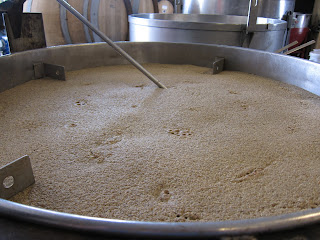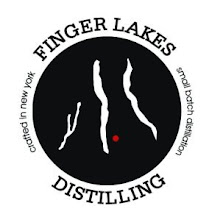When you visit our tasting room, or purchase a bottle of our spirits at a liquor store or in a cocktail at a restaurant, you might admire the playful bottle designs, or the smoothness of our products on your tongue. But this is only half of the picture- most of the work happens behind the scenes. In order to fully appreciate the flavor in your glass, we think it's important that you understand what happens downstairs on the production side of our operation. To that end, we will be walking through the production for several of our spirits in short installments. This inaugural installment in
From the Ground, Up will feature the first step in producing
McKenzie Bourbon.
We start the process with locally grown corn, rye, and bring in the finest malt obtainable.
A little about the grains. The corn we use is grown about 3 miles from the distillery. It needs to be dry, and have a good bushel weight, meaning it will produce a good amoun

t of alcohol. But it also must have a good flavor. The rye is grown across the lake from us in Dundee, New York, and also by a farmer in Big Flats, NY. The rye must be dry as well, but most importantly, it must have a good flavor. When mashed in a bourbon mash, the rye is called the
flavoring grain. It lends a spicy component to the finished product. We also bring in fresh malted barley, which is barley that has been partially germinated to produce enzymes that convert the starch found in the corn and the rye into sugar, which is then converted into alcohol (more on this later).
We use only the natural enzymes in the malted barley to convert our starch into sugar— it's possible to skip this step and use commercial enzymes, but we think that natural enzymes make a better bourbon. (Pictured above: corn, rye, and malted barley. Below: Thomas adds the ground corn to boiling water.)
Once we have

our grains, the first step in bourbon production is grinding the corn into a coarse meal. We add this corn meal to boiling water, which makes the starch readily available to the malt. After a long hot cook, the corn is cooled down to around 180 degrees, and we add our rye, which has been milled into a fine flour. After a few minutes we begin cooling again to around 140 degrees, and at that point we add our finely ground barley malt. We maintain this temperature for a little while, giving the malt enzymes a chance to convert the starch in the corn and rye into sugar.
At this point, we add backset to the cooker. Backset is mash that has been stripped of its alcohol in the still. It is necessary in order to drop the pH of the mash, so that it can ferment properly.
This is what is meant by the term "sour mash bourbon whiskey". (Pictured right: the mash boils. Close up video below.)
After the backset goes in, the mash is cooled to around 80 degrees so that we can pitch our yeast. We don't want the mash to be too hot or else the yeast will be killed, but if it's too cool the mash won't ferment properly. We then transfer the mash to an open top fermenter to ferment for around 3 days.
Ferme ntation is the process that occurs when the yeast metabolizes the sugar that was created in the mashing process. It produces 3 things: alcohol, carbon dioxide and heat.
ntation is the process that occurs when the yeast metabolizes the sugar that was created in the mashing process. It produces 3 things: alcohol, carbon dioxide and heat. After about 3 days, we transfer the fermented mash, now termed beer, to the still.
More on the distillation process next time...
 hen many shoppers were waking up early for the best deals on holiday gifts, FLD was having a Thanksgiving celebration of our own. We celebrated with free tastings, live music by local band Miller's Wheel, and the premiere of a brand new McKenzie whiskey.
hen many shoppers were waking up early for the best deals on holiday gifts, FLD was having a Thanksgiving celebration of our own. We celebrated with free tastings, live music by local band Miller's Wheel, and the premiere of a brand new McKenzie whiskey. With the holiday season just around the corner, a bottle of McKenzie Pure Potstill is a great gift for the inexperienced whiskey drinker looking for an accessible entrance into the world of whiskey, or for the veteran whiskey drinker on the lookout for something new and different. Or, for the real whiskey buff, go the whole nine yards and treat them to the full McKenzie line.
With the holiday season just around the corner, a bottle of McKenzie Pure Potstill is a great gift for the inexperienced whiskey drinker looking for an accessible entrance into the world of whiskey, or for the veteran whiskey drinker on the lookout for something new and different. Or, for the real whiskey buff, go the whole nine yards and treat them to the full McKenzie line. Although the cold season is upon us, FLD will be open 7 days a week all winter long. So stop by our tasting room for just the thing to warm you up!
Although the cold season is upon us, FLD will be open 7 days a week all winter long. So stop by our tasting room for just the thing to warm you up!
















